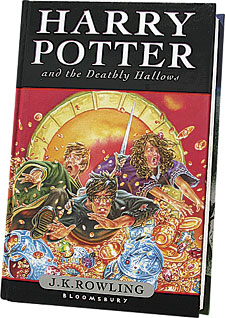In her wildly successful "children's" series JK Rowling has constructed a narrative that asks us to consider not just how we should live but matters of eternal consequence.
When faced with the reality of death do we tighten our grip on this life or do we look to the life to come? Is death conquered by clinging to physical existence at the cost of the soul or is there another way?
From book one to seven, death is the fundamental recurring theme. The series begins with death " the murder of Harry Potter's parents " and death follows Harry throughout the seven novels.
In each instalment Harry faces real death and undergoes a death-like experience or a figurative death. In each he is redeemed. While there is a symbolic resurrection woven into each tale, death and evil are not ultimately vanquished. Not yet. But with book seven it is time for good to confront evil once and for all.
At the close of book six, Harry was left with a task; find and destroy the remaining horcruxes created by his nemesis, Voldemort. A horcrux is something in which a person hides a fragment of their soul. (The soul is fragmented when a person commits murder.) The purpose of such a monstrous device? To render oneself immortal. The cost? The destruction of one's soul. Only when every horcrux has been destroyed can Voldemort be killed. And the Dark Lord must be killed if peace and harmony are to be restored. And if Harry Potter is to live.
 For fans this final novel may bring frustrations and disappointments. Some characters are all but absent, some crises too readily resolved. Dumbledore's acquisition of feet of clay may outrage some readers. Others may flounder in the endless detail. Most of the questions left dangling after book six are answered but there are others posed that need explanation. Hardly a children's book, Deathly Hallows is, by necessity a dark tale, there are scant moments of Rowling's humour and many beloved characters meet their end.
For fans this final novel may bring frustrations and disappointments. Some characters are all but absent, some crises too readily resolved. Dumbledore's acquisition of feet of clay may outrage some readers. Others may flounder in the endless detail. Most of the questions left dangling after book six are answered but there are others posed that need explanation. Hardly a children's book, Deathly Hallows is, by necessity a dark tale, there are scant moments of Rowling's humour and many beloved characters meet their end.
More than just a succession of creative adventures, the Harry Potter series has offered vast literary treasures. (More than my humble brain can handle.) Dotted throughout the novels are allusions to classical and medieval literature, alchemy, architecture, art, mythology and not least Christianity.
Continuing the themes of death and redemption, sacrifice and selfless love, The Deathly Hallows is even more explicit in its Christian concerns than its predecessors. As Harry and Hermione search for insight in Godric's Hollow they are struck by two inscriptions; "Where your treasure is, there will your heart also be" (Matthew 6:21) and "The last enemy that shall be destroyed is death" (1 Corinthians 15:26).
Both inscriptions confound Harry but the second troubles him. Inscribed upon his parents' gravestones he worries that such thoughts are more akin to a Death Eater than his parents. After all it is Voldemort who is consumed by his desire to conquer death and achieve immortality. Hermione assuages his anxiety.
"It means, you know, living beyond death. Living after death." (page 269) Christians will know it means even more than that.
Throughout the Harry Potter novels we are shown different responses to death. Voldemort wants to conquer death for himself so that he can be immortal, whatever the cost. Harry deplores death. He grieves for his parents, for Sirius, Dumbledore and others. But he recognises that there is something more powerful than death and through this death can be vanquished. Love.





















